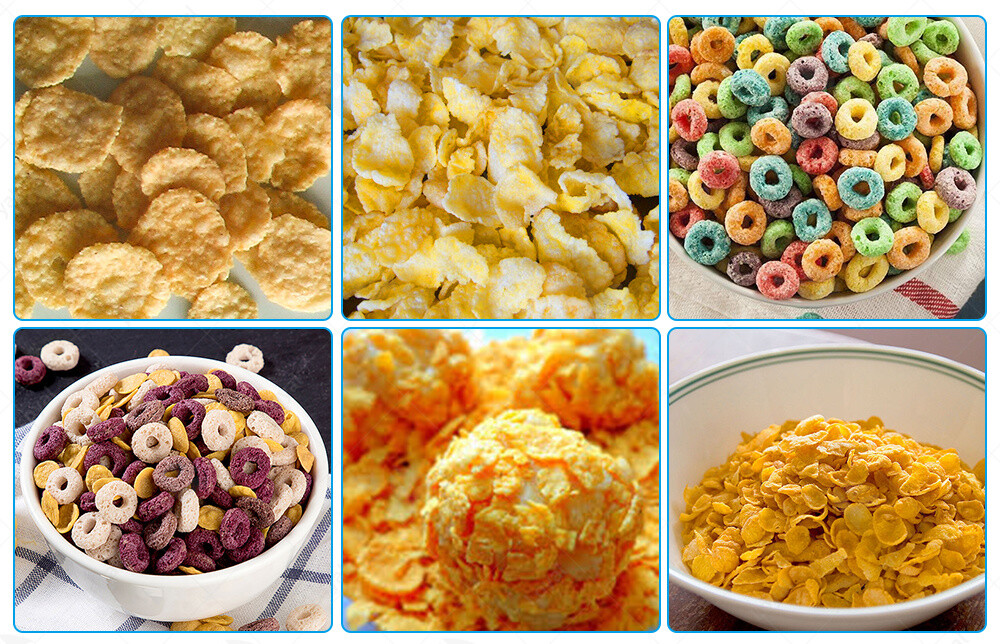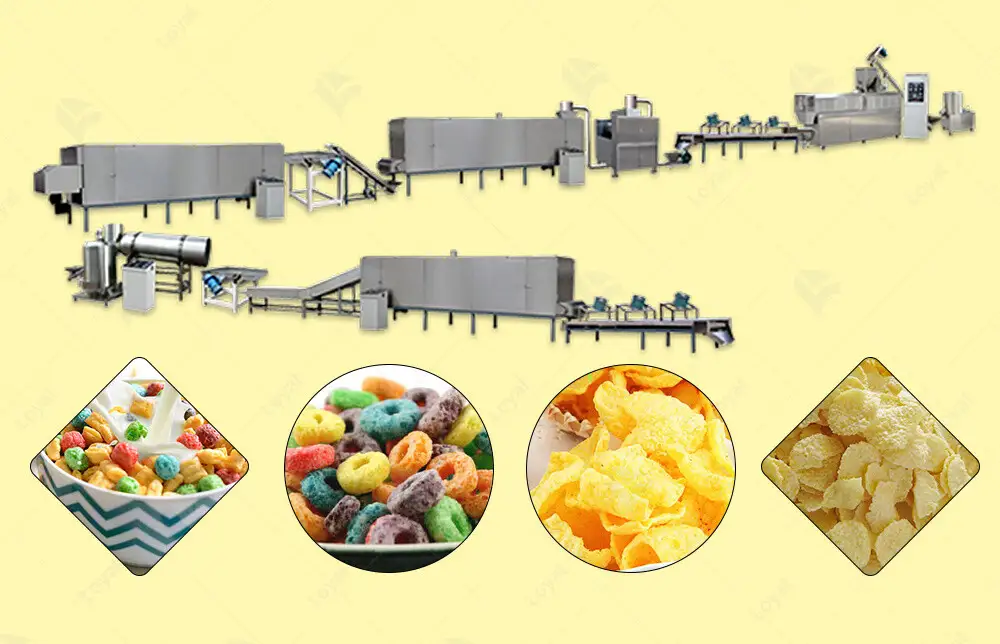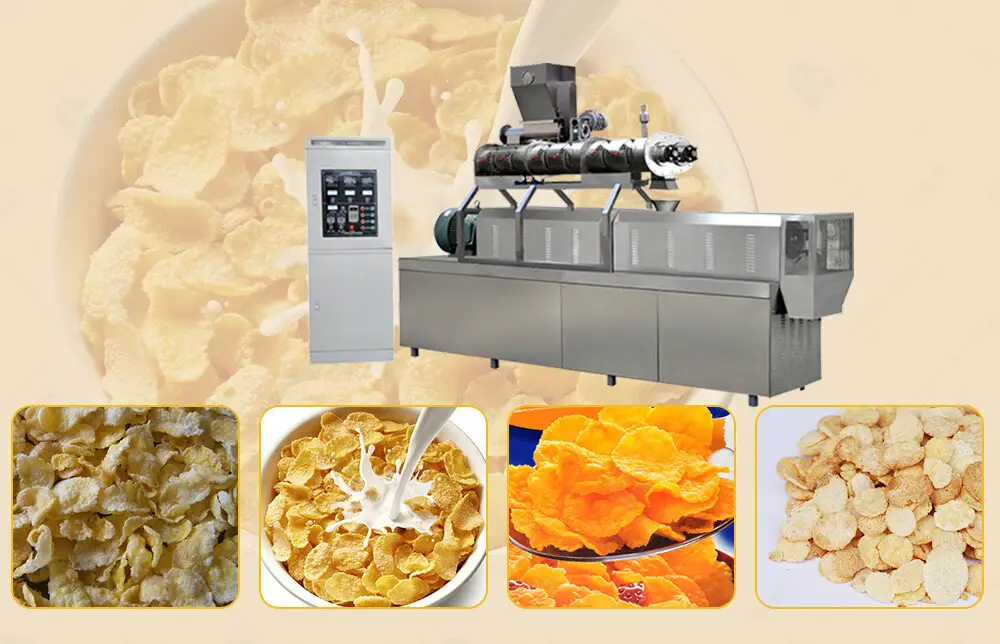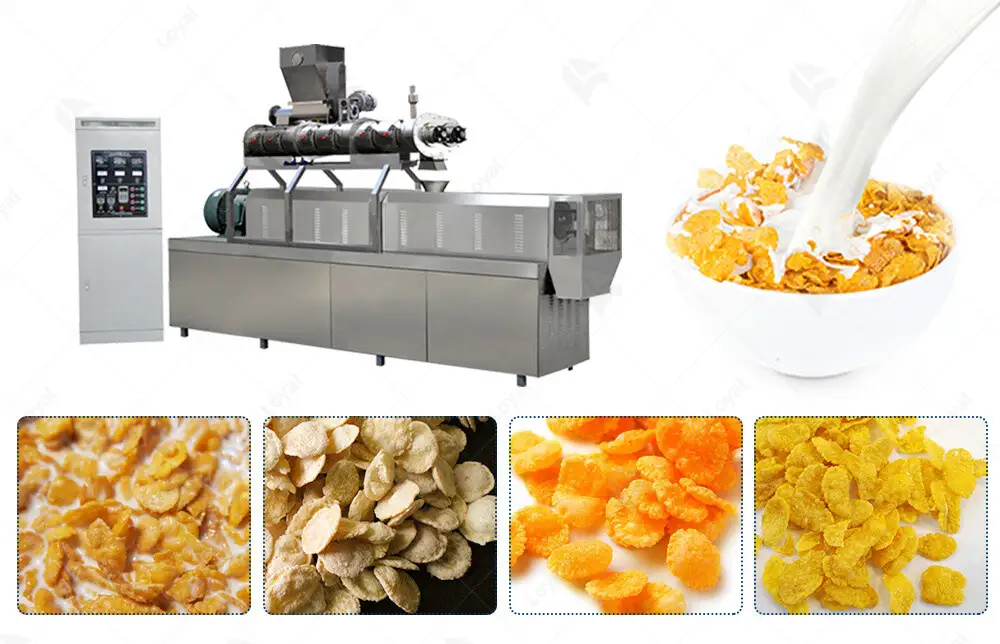The Ultimate Guide to corn flakes making machine in 2024
How it Differs from Traditional Machines
The corn flakes making machine has revolutionized the breakfast cereal industry, distinguishing itself significantly from traditional machines through a variety of technological advancements and efficiency improvements.
1.Automation and Efficiency
Traditional corn flakes production relied heavily on manual labor and semi-automated processes, which were time-consuming and prone to human error. In contrast, a fully automatic corn flakes making machine incorporates advanced automation technologies, streamlining the entire production process. From ingredient mixing to packaging, every step is controlled by sophisticated software systems, ensuring precision and consistency.
The automation of these machines minimizes the need for manual intervention, thereby reducing labor costs and the potential for errors. This shift not only enhances the overall efficiency of production but also significantly boosts output, enabling manufacturers to meet high market demands without compromising on quality.
2.Advanced Technology Integration
One of the primary differences between traditional machines and modern fully automatic corn flakes making machines is the integration of cutting-edge technologies such as the Internet of Things (IoT) and Artificial Intelligence (AI). These technologies allow for real-time monitoring and control of the production process, providing valuable insights into machine performance and product quality.
Traditional machines lacked this level of connectivity and data analysis, making it difficult to optimize production and detect issues promptly. In contrast, modern machines equipped with IoT and AI can predict maintenance needs, optimize energy consumption, and adjust production parameters on the fly to ensure consistent product quality.
3.Enhanced Customization and Flexibility
Another significant difference lies in the customization and flexibility offered by fully automatic corn flakes making machines. Traditional machines were often limited to producing a single type of corn flakes with little room for variation. Modern machines, however, are designed with flexibility in mind, allowing manufacturers to easily switch between different recipes and production settings.
This adaptability is crucial in today's market, where consumer preferences are continually evolving. Manufacturers can now produce a wide range of corn flakes varieties, including gluten-free, organic, and fortified options, catering to diverse dietary needs and preferences.
4.Improved Quality Control
Quality control in traditional corn flakes production was largely manual and subjective, leading to inconsistencies in the final product. Fully automatic corn flakes making machines, on the other hand, incorporate advanced quality control systems that ensure uniformity and high standards throughout the production process.
These machines utilize sensors and automated inspection technologies to monitor product quality at every stage. Any deviations from the set standards are immediately detected and corrected, ensuring that each batch of corn flakes meets the highest quality criteria.
5.Environmental and Economic Benefits
The environmental impact of traditional corn flakes production was often significant due to high energy consumption and waste generation. Modern fully automatic corn flakes making machines are designed to be more eco-friendly, incorporating energy-efficient technologies and waste reduction mechanisms.
These machines optimize the use of raw materials and energy, reducing the overall carbon footprint of the production process. Additionally, the economic benefits of reduced operational costs and increased production efficiency make fully automatic machines a more sustainable and profitable choice for manufacturers.

Benefits of an Automated Process
The introduction of a fully automatic corn flakes making machine into the production line offers numerous benefits, transforming the efficiency, consistency, and overall quality of cereal manufacturing. This section delves into the primary advantages of utilizing an automated process in the corn flakes production industry.
Increased Efficiency and Productivity | One of the most significant benefits of a fully automatic corn flakes making machine is the dramatic increase in production efficiency. Traditional methods of producing corn flakes involved multiple manual steps, each susceptible to human error and inconsistency. Automation streamlines these processes, significantly reducing the time required to produce large quantities of corn flakes. Automated machines operate continuously with minimal downtime, maximizing throughput. This increase in productivity allows manufacturers to meet high market demands more effectively and can result in substantial cost savings over time. |
Consistent Product Quality
| Consistency is a critical factor in food production, and fully automatic corn flakes making machines excel in this area. Automated systems are designed to maintain precise control over each stage of the production process, from ingredient mixing to cooking, flaking, drying, and packaging. This level of control ensures that every batch of corn flakes meets exact specifications for texture, taste, and nutritional content. Byminimizing human intervention, automated machines reduce the variability that often plagues manual production methods. This consistent quality is crucial for building brand reputation and customer loyalty in a competitive market. |
Enhanced Food Safety
| Food safety is paramount in the production of breakfast cereals. Fully automatic corn flakes making machines incorporate advanced sanitary design features that reduce the risk of contamination. Stainless steel construction, easy-to-clean surfaces, and automated cleaning cycles ensure that the production environment remains hygienic. Automation also reduces the number of touchpoints in the production process, further minimizing the risk of contamination from human handling. These measures contribute to a safer final product that meets stringent food safety regulations. |
Cost Savings
| While the initial investment in a fully automatic corn flakes making machine can be substantial, the long-term cost savings are significant. Automation reduces labor costs by minimizing the need for manual labor. It also decreases waste and optimizes the use of raw materials, leading to more efficient production. Energy-efficient designs and the ability to operate continuously without interruption further contribute to cost savings. Over time, these benefits can offset the initial investment and improve the overall profitability of the production line. |
Flexibility and Customization | Modern consumers demand variety and customization in their food products. Fully automatic corn flakes making machines offer the flexibility to produce different types of corn flakes, including gluten-free, organic, and fortified varieties. Advanced control systems allow manufacturers to easily adjust recipes and production parameters to meet changing market trends and consumer preferences. This adaptability is a significant advantage over traditional production methods, which are often limited in their ability to accommodate new product variations quickly and efficiently. |
Environmental Sustainability | Sustainability is an increasingly important consideration in food production. Fully automatic corn flakes making machines are designed with energy-efficient technologies that reduce the overall environmental impact of the production process. These machines optimize the use of resources, such as water and energy, and minimize waste generation. By improving production efficiency and reducing resource consumption, automated machines contribute to a more sustainable manufacturing process. This not only helps to protect the environment but also enhances the manufacturer's reputation as a responsible and eco-friendly producer. |

Key Technologies in Corn Flakes Making Machines
The evolution of corn flakes making machines has been driven by significant advancements in technology, enhancing their efficiency, versatility, and output quality. This section explores the key technologies integrated into modern corn flakes making machines, which distinguish them from traditional systems and contribute to their superior performance.
1.Advanced Automation and Control Systems
Modern corn flakes making machines are equipped with state-of-the-art automation and control systems that streamline the production process. These systems utilize programmable logic controllers (PLCs) and human-machine interfaces (HMIs) to enable precise control over various production parameters, such as temperature, cooking time, and pressure.
Automated systems can be programmed to adjust settings dynamically based on real-time data, ensuring optimal conditions for each production run. This level of control not only enhances product consistency but also minimizes the risk of errors and variability, resulting in a high-quality final product.
2.Internet of Things (IoT) Integration
The integration of the Internet of Things (IoT) technology has revolutionized the functionality of corn flakes making machines. IoT-enabled machines are equipped with sensors and connectivity features that allow them to collect and transmit data to a centralized system or cloud platform. This connectivity enables real-time monitoring of machine performance, production metrics, and environmental conditions.
With IoT, manufacturers can remotely access and analyze data from their production lines, facilitating predictive maintenance, troubleshooting, and process optimization. This technology significantly reduces downtime, enhances equipment longevity, and improves overall production efficiency.
3.Advanced Cooking and Flaking Technology
The cooking and flaking stages are critical in corn flakes production, and modern machines feature advanced technologies to enhance these processes. High-efficiency cooking systems use precise temperature control and steam injection techniques to ensure uniform cooking of the corn flakes. These systems reduce cooking time while maintaining the nutritional integrity and texture of the flakes.
Additionally, advanced flaking technology, such as high-speed rollers and automated flaking units, ensures consistent thickness and shape of the corn flakes. This technology minimizes waste and maximizes yield, improving the overall efficiency of the production process.
4.Enhanced Drying and Cooling Systems
Efficient drying and cooling are essential for producing high-quality corn flakes. Modern corn flakes making machines incorporate advanced drying and cooling technologies, such as infrared dryers, hot air dryers, and fluidized bed coolers. These systems provide precise control over drying temperatures and airflow, ensuring uniform moisture removal and preventing over-drying or scorching.
The integration of high-efficiency cooling systems, including air circulation and cooling tunnels, further enhances the quality and crispness of the corn flakes. These technologies help maintain the desired texture and prevent the formation of undesirable defects, ensuring a superior product.
5.Quality Control and Inspection Technologies
Quality control is paramount in corn flakes production, and modern machines are equipped with advanced inspection and quality control technologies. Vision systems, equipped with high-resolution cameras and image processing software, inspect the corn flakes for size, shape, color, and defects. These systems can automatically reject any substandard flakes, ensuring only the highest quality products reach the market.
Additionally, integrated sensors and monitoring systems track critical quality parameters, such as moisture content, density, and product consistency. This continuous monitoring allows for immediate adjustments to the production process, ensuring that every batch of corn flakes meets stringent quality standards.
6.Energy Efficiency and Sustainability Features
Sustainability is a key consideration in modern corn flakes making machines. Advanced machines are designed with energy-efficient components and technologies that reduce power consumption and minimize environmental impact. Features such as heat recovery systems, variable frequency drives (VFDs), and energy-efficient motors are standard in these machines, significantly lowering energy costs and reducing the carbon footprint.
Furthermore, many modern corn flakes making machines are designed with eco-friendly materials and processes, such as reducing water usage and minimizing waste. These features align with industry standards for sustainability and help manufacturers achieve their environmental goals.

Challenges and Considerations in Using Fully Automatic Corn Flakes Making Machines
The adoption of fully automatic corn flakes making machines brings numerous benefits to food manufacturers, but it also presents unique challenges and considerations that need to be addressed to optimize production efficiency and product quality.
1. Initial Investment and Costs
Investing in a fully automatic corn flakes making machine entails significant upfront costs. These machines are equipped with advanced technology and automation systems, which can lead to a higher initial investment compared to traditional or semi-automatic equipment. Manufacturers need to carefully evaluate their budget and projected return on investment (ROI) when considering the purchase of these machines.
However, it's important to note that while the initial investment may be higher, the long-term operational efficiency and productivity gains often outweigh the upfront costs, resulting in overall cost savings over time.
2. Technological Complexity and Maintenance
Fully automatic corn flakes making machines are equipped with sophisticated technology, including PLCs, HMIs, and IoT integration. While these technologies enhance operational control and efficiency, they also require specialized knowledge for operation and maintenance.
Manufacturers must ensure that their staff receive adequate training to operate and troubleshoot these machines effectively. Regular maintenance and calibration of the automated systems are essential to prevent downtime and ensure continuous production. Partnering with suppliers that offer comprehensive support and maintenance services is crucial for maximizing the uptime and longevity of the equipment.
3. Production Flexibility and Customization
One challenge of fully automatic corn flakes making machines is balancing production flexibility with automation. These machines are designed for high-volume production with consistent quality, which may limit the ability to quickly adjust production parameters or introduce new product variations.
Manufacturers must carefully plan production schedules and consider market demand when setting up automated production lines. Incorporating modular designs and flexible configurations into the machine layout can enhance versatility and facilitate quick changeovers between different product specifications.
4. Quality Control and Product Consistency
Maintaining product consistency and quality control is essential in the food industry, especially with cereal products like corn flakes. While automated systems offer precise control over production parameters, variations in raw materials or environmental conditions can still impact product quality.
Implementing robust quality assurance protocols, including regular sampling and testing of finished products, is necessary to ensure that each batch of corn flakes meets stringent quality standards. Automated inspection systems, such as vision systems and sensors, can help detect deviations from specifications and minimize the risk of producing substandard products.
5. Regulatory Compliance and Food Safety
Adhering to regulatory requirements and ensuring food safety are critical considerations for manufacturers of cereal products. Fully automatic corn flakes making machines must comply with food safety standards and regulations set forth by local and international authorities.
Manufacturers should implement Hazard Analysis and Critical Control Points (HACCP) protocols and adhere to Good Manufacturing Practices (GMP) throughout the production process. Regular audits and inspections are essential to verify compliance and maintain consumer trust in the safety and integrity of their products.
6. Energy Efficiency and Sustainability
While modern corn flakes making machines incorporate energy-efficient technologies, such as heat recovery systems and VFDs, optimizing energy usage remains a consideration. Energy costs constitute a significant portion of operational expenses, and manufacturers must continuously monitor and optimize energy consumption to minimize costs and environmental impact.

Reference
The following are five authoritative foreign literature websites in the field of Industrial food machinery:
1. Food Engineering Magazine
Website: https://www.foodengineeringmag.com/
2.Food Processing Magazine
Website: https://www.foodprocessing.com/
3.Journal of Food Engineering
Website:https://www.journals.elsevier.com/journal-of-food-engineering
4. Food Manufacturing Magazine
Website:https://www.foodmanufacturing.com/
5. International Journal of Food Science & Technology
Website:https://onlinelibrary.wiley.com/












